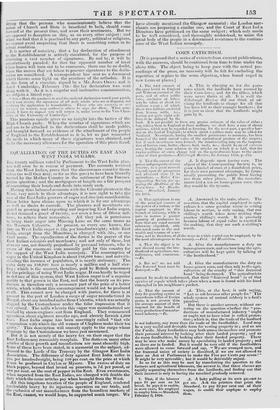EQUALIZATION OF THE DUTIES ON EAST AND WEST INDIA SUGARS.
THE twenty millions voted by Parliatnent to the West India plan- ters will soon be in course of payment. The accounts received from the West Indies, prove that the slaveowners consider them- selves (as well they may, so far as this goes) to have been liberally treated by the Mother Country in the settlement of the Emanci- pation question ; and the mortgagees at length see a fair prospect of converting their bonds and deeds into ready cash.
Having thus balanced accounts with the Colonial planters in the West, very much to their advantage, it is now right to take the case of the East India growers of sugar and rice into consideration. These latter have claims upon us which it is for our advantage as well as theirs to concede. The planters and merchants en- aged in growing and exporting and importing East India sugar, Flo not demand a grant of twenty, nor even a loan of fifteen mil- lions, to relieve their necessities. All they ask is permission to bring their sugar into Mincing Lane on the same terms as the ‘‘'estern Colonists. At present, as every one knows, the duty on West India sugar is 24s. per hundredweight; while East India, except from the Mauritius, is charged with 32g., or one Clip' more. The equalization of the duties is the prayer of the E.st Indian colonists and merchants; and not only of these, but of every one, not directly prejudiced by personal interests, who is rotate of the enormous sum annually paid by this country for the support of the West India monopoly. The consumption of sugar in the United Kingdom is about 180,000 tons; and notwith- btanding the increase of population, it is nearly stationary. The extra duty on 130,000 tuns therefore, nearly a million and a half ster- hug ; which is the amount, therefore, paid by British consumers ter the privilege of using West India sugar. It can hardly be urged in defence of this system, that West Indian sugar is of a superior quality to that grown in the East, and that the bounty on its pro- duction is therefore only a necessary part of the price of a better article, which without this encouragement would not be produced at all. This cannot now be charged with justice, for there is at present in the port of London a cargo of sugar manufactured in Bengal, about one hundred miles from Calcutta, which was actually stopped by the Customhouse under the false impression that it
Was refined. The mills wherein this sugar was manufactured are worked by steam-engines sent from England. They commenced
operations about eighteen months ago, and already furnish 4,000 tons. East India sugar has been sneeringly called "that vile composition with which the old women of Clapham make their tea gritty.- This description will scarcely apply to the cargo whose stoppage by the Customhouse we have just mentioned.
But it is not merely of the heavy tax on their sugar that the East Indians may reasonably complain. The duties on many other articles of their growth and manufacture are most absurdly high.
Some of these have been stated, in a memorial on the subject, ad- dressed to the Lords of the Treasury by the Glasgow East India
Association. The difference of duty against East India coffee is P50. per hundredweight, being 100 per cent. on the price at which it can be produced in Ceylon or Mysore. The excess of duty on
black pepper, beyond that levied on pimento, is 7d. per pound, or 300 per cent. on the cost of pepper in the East. Even sweetmeats, when imported from the East Indies, are charged with double the duty which the same articles pay when brought from the West.
All this iniquitous taxation of the people of England, rendered incalculably heavy by its injurious operation on our trade, and
the exclusion of our manufactures from the boundless markets of the East, cannot, we would hope, be supported much longer. We
have already mentioned the Glasgow memorial : the London mer- chants are preparing a similar one, and the Court of East Ind'a Directors have petitioned on the same subject ; which only needs to be well considered, and thoroughly understood, to unite the great body of the people in a determined resistance to the continu- ance of the West Indian monopoly.




















 Previous page
Previous page